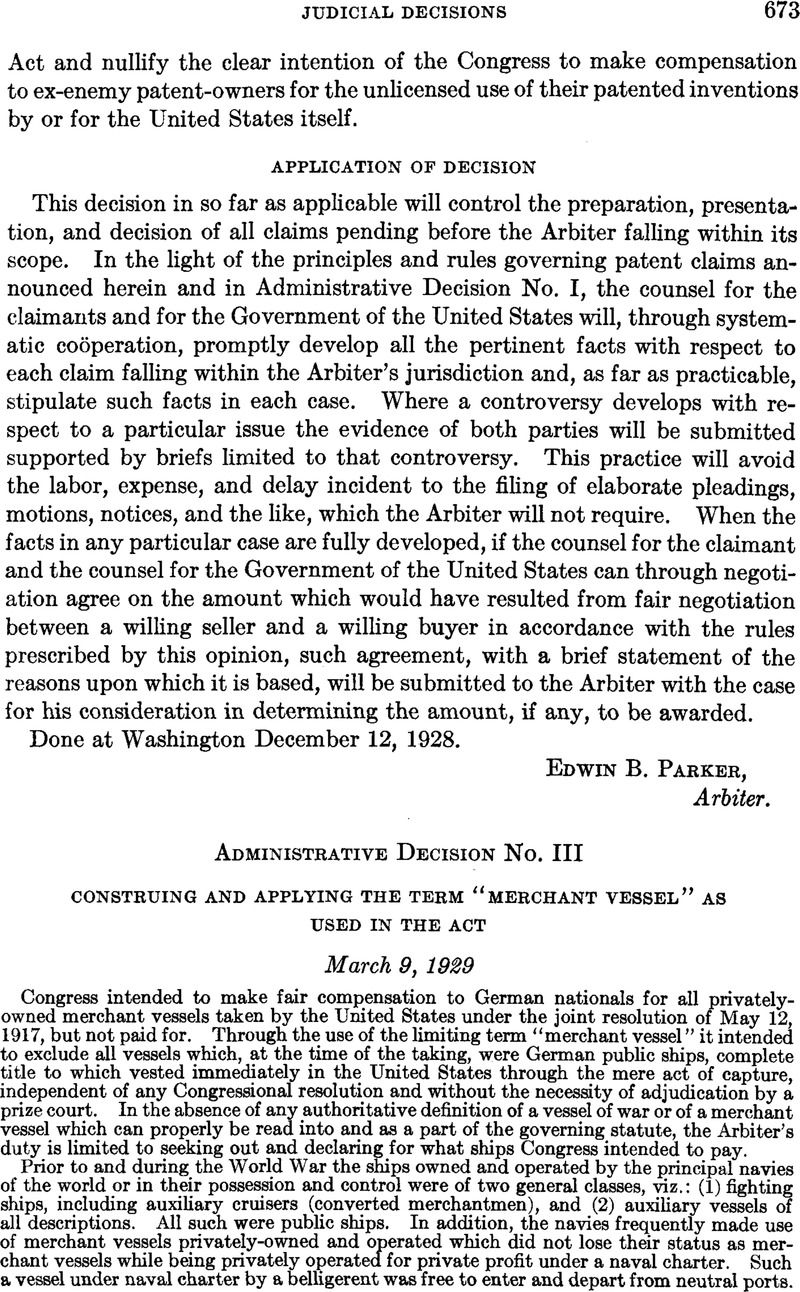No CrossRef data available.
Article contents
Administrative Decision No. III Construing and Applying the Term “Merchant Vessel” as Used in the Act
Published online by Cambridge University Press: 04 May 2017
Abstract

- Type
- Judicial Decisions Involving Questions of International Law
- Information
- Copyright
- Copyright © American Society of International Law 1929
References
1 The Settlement of War Claims Act of 1928, Section 3(b), provides— “ It shall be the duty of the Arbiter … to determine the fair compensation to be paid by the United States, in respect of— “ (1) Any merchant vessel (including any equipment, appurtenances, and property contained therein), title to which was taken by or on behalf of the United States under the authority of the Joint Resolution of May 12,1917 (Fortieth Statutes, page 75)… .”
2 From the numerous illustrations supporting this statement it will suffice to note that the British Prize Courts and the French Prize Council held that pleasure yachts were not merchant vessels within the meaning of the Sixth Hague Convention. The German Prize Court held that the term “ merchant vessels” as used in the German Prize Code includes all vessels not owned by the state and hence would include a privately-owned seagoing pleasure yacht (Gamer, Prize Law During the World War, sections 205 to 209, inclusive, also section 61 and authorities there cited).
3 Article 99, Instructions for the Navy of the United States Governing Maritime Warfare, June 30, 1917; Cobbett, Leading Cases (4th ed.), Vol. II, page 275; Oppenheim, International Law (4th ed.), Vol. II, page 326; Hyde, International Law, Chiefly as Interpreted and Applied by the United States, Vol. II, page 818.
4 United States Naval War College, International Law Situations, 1912, page 155; Decree of August 21, 1914, of French Government published in Journal Offciel No. 230; “ Armed Merchant Ships” by A. Pearce Higgins in A m e r ic a n Jo u r n a l o p In t e r n a t io n a l Law, 1914, Vol. 8, at page 712; Annual Report of the United States Navy Department for the fiscal year 1915, page 363; The Attualita, 238 Fed. 909.
5 As to the permanence of conversion for the duration of the war, see United States Naval War College, International Law Topics and Discussions, 1913, pages 148-154; opinion of Joint State and Navy Neutrality Board, Serial No. I l l , dated October 5, 1915, filed with War Claims Arbiter as part of Exhibit A in Docket No. 794; Report of Henri Fromageot on Seventh Hague Convention, Reports to the Hague Conferences of 1899 and 1907, edited by James Brown Scott (Carnegie Endowment), pages 597-599; Proceedings of the Hague Peace Conferences, Conference of 1907 (Carnegie Endowment translation), Vol. Ill, pages 747, 811, 993, 999, and 1079.
6 Senate Report No. 273, February 9, 1928, 70th Congress, 1st Session (hereinafter referred to as “ Senate Report” ), page 6.
7 See authorities cited in footnote 4 supra.
8 Senate Report, page 6.
9 Congressional Record (February 16, 1928), Vol. 69, page 3101, 70th Congress, 1st Session.
10 For attitude of Department of State, see letter from Acting Secretary Polk to Senator Broussard dated May 18, 1916.
11 As a matter of fact, when the Joint Resolution of May 12, 1917, was pending before the Senate an amendment providing for the condemnation of these vessels as prizes of war was offered and rejected.
12 See statements of Representative Alexander, in charge of the resolution in the House of Representatives, Congressional Record, 65th Congress, 1st Session, pages 1904 and 1905; also letter from Attorney General Gregory to President Wilson dated August 6, 1917 (Department of Justice file 9-18 General), in which this statement occurs: “ It is clear, from the history of the resolution, that both Houses of Congress intended to postpone until the conclusion of the war all judicial questions arising in the seizure of these ships.”
13 Gamer, Prize Law During the World War, pages 284-288, and cases cited.
14 House Report No. 17, December 15, 1927, 70th Congress, 1st Session, page 6; Senate Report, page 17.
15 Letter of German Ambassador von Bemstorff to Secretary of State Lansing, November11,1915, Foreign Relations of the United States (hereinafter cited as “ Foreign Relations” ), 1915, Supplement, at page 839.
16 Letter of Secretary of State Lansing to German Ambassador von Bernstorff, December 22, 1915, Foreign Relations, 1915, Supplement, page 843.
17 Letter from Acting Secretary of State Lansing to German Ambassador von Bernstorff, October 30, 1914, Foreign Relations, 1914, Supplement, page 584.
18 Foreign Relations, 1914, Supplement, 587.
19 Foreign Relations, 1914, Supplement, 589.
20 Foreign Relations, 1914, Supplement, page 588.
21 Letter of Secretary of State Lansing to German Ambassador von Bernstorff, December 22, 1915, Foreign Relations, 1915, Supplement, page 843; also editorial of Dr. James Brown Scott, senior member of the Joint State and Navy Neutrality Board, American Journal of International Law, Vol. 9 (1915), page 486, where it is stated “ internment is applied solely to ships of war.” ‘
22 Senate Report, page 6.




